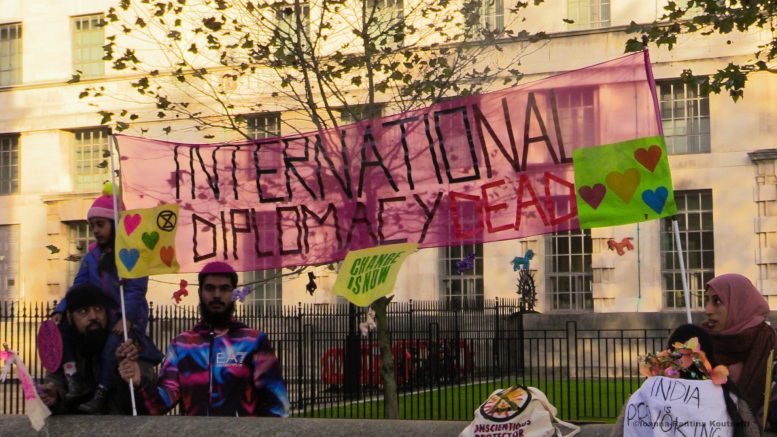“Only one reason. People are suffering. It’s terrible.” Mo Naved Ali, in his late 50s, said with a quivering voice, a few drops of tear under his eyes. As a Kashmiris himself, the brutality of what’s happening in Kashmir is unbearable to him.
On 27 October, hundreds of Kashmiris and Pakistanis assembled at Parliament Street to demand a governmental action for the Kashmiris conflict. The day for a rally meant a lot to protesters. ‘27 October’ is the day when India has forcibly taken over Kashmir in 1947 which marked it as ‘dark’ time to then Kashmiris. It aches them after all these years to name it as the ‘Black Day’. Ironically, 27 October means something different to Indians; it’s the day of Diwali, a festival of lights, one of the biggest annual fairs in their calendar. What is ‘celebration’ to one, is to others a ‘fight’ for human right.
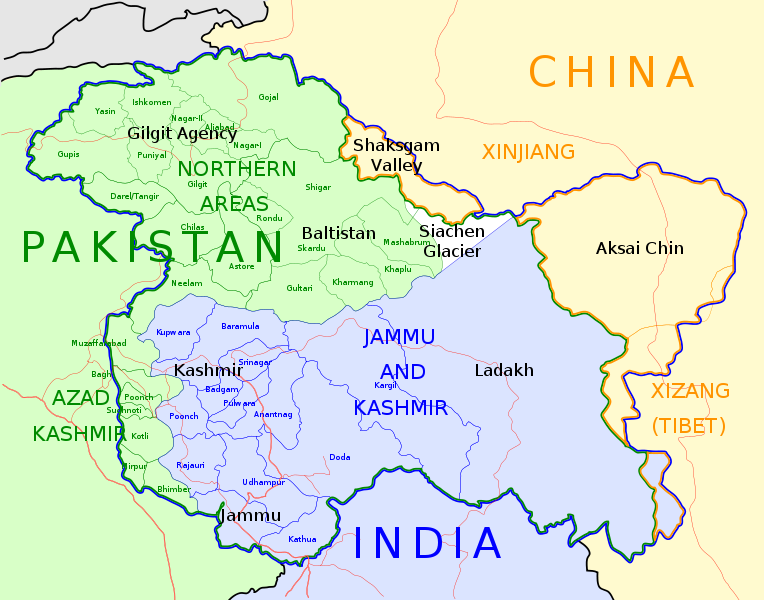
Credits to: William Baulch from Foreign Brief
“Kashmir is an unresolved agenda of the subcontinent. When the subcontinent was divided into two countries, India and Pakistan, the people of Kashmir were promised that they will be given choices on whether they want to stay with Pakistan or with India. But until today, this promise has not been fulfilled.”, said Professor Salim Ahktar, 52. When the question, “What is this protest about?”, was dropped to the crowd, everyone finger-pointed Professor Ahktar to come forward and speak for them.
As Professor Ahktar said, Kashmir is a region located at the northernmost end of India and parted between Pakistan, India and China. Just after the liberation of Pakistan and India from the British rule in August 1947, it was quite obvious that Kashmir would belong to Pakistan as the majority of locals were Muslims. Yet, storm loomed while they slept. Then Maharaja – the ‘great leader’ – planned to accede Kashmir to India through an illegitimate route which gave a room for India to airlift its troops over Kashmir valley. “They physically entered Kashmir,” Professor Ahktar added. It’s certainly a very conflicted area between three nations – particularly between Pakistan and India – but, the real problem came when India initiated a critical action.
India ‘revoked the special status’ on 4 August. What does this mean really? The Indian government has decided to abolish Article 370 and 35A from its constitution which has been granting Kashmir a special right to keep its legal and regional autonomy up until today. “I just feel that India and Kashmir ‘had an agreement’ (making an emphasis), and India broke it,” said Pavin Abdullah, 57, a Pakistani protester.
Due to the Indian government’s bombshell, Kashmiris stood up – violently – to take back their rights and establish themselves as a free nation. The hostility amid Kashmiri rebels grew out of control; causing casualty; India pulled out a joker- military force.
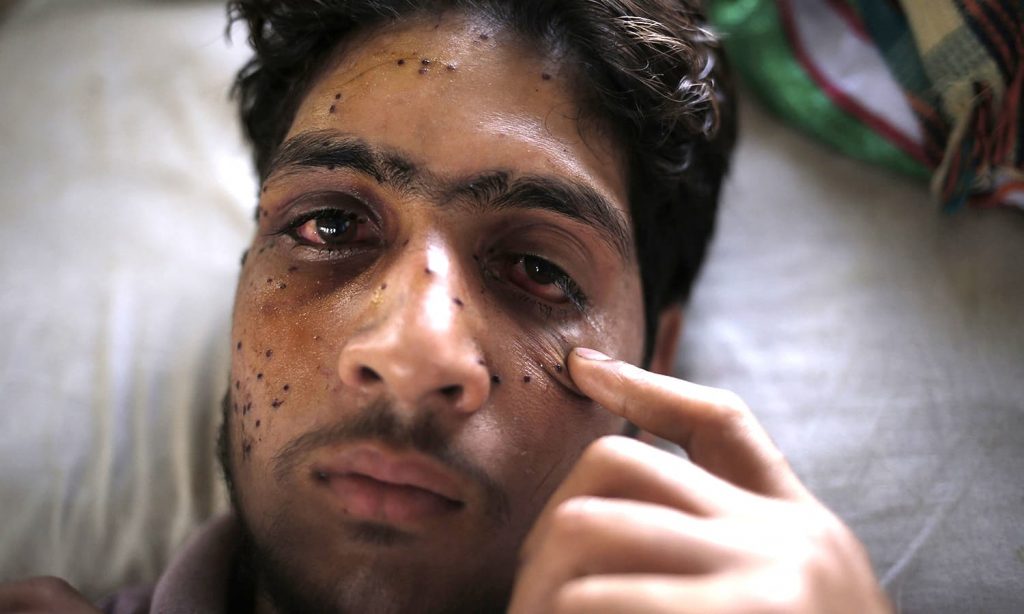
Pellet gun victim scarred for the rest of his life; Ahmer Khan
“They’ve imposed a curfew and people are limited to their own houses inside, they can’t go out. The schools and colleges, all the establishments are closed, it’s almost like marshall law. So again, this is a problem.” said Ali L., a Technologist from Sheffield. Indian troops took over Kashmir, again, with their armed forces to oppress any form of rebellious activities. People are under curfew, food is in short supply, communication is cut off… it sounds more likely to be in 1945 than in 2019.
At the scene of the solidarity march, children were a crucial part. “My granddaughter was really sad when she saw the pictures (pictures of deaths and violence). When she saw them, she was surprised, and I kind of had to explain what’s going on. And she wondered why police are not arresting bad people.” said Abdullah. To that young girl, the ‘police’ were one to live up to justice; yet it leaves us all questioning, where do the Indian police stand in the Kashmir crisis? What about the British government or the United Nations?
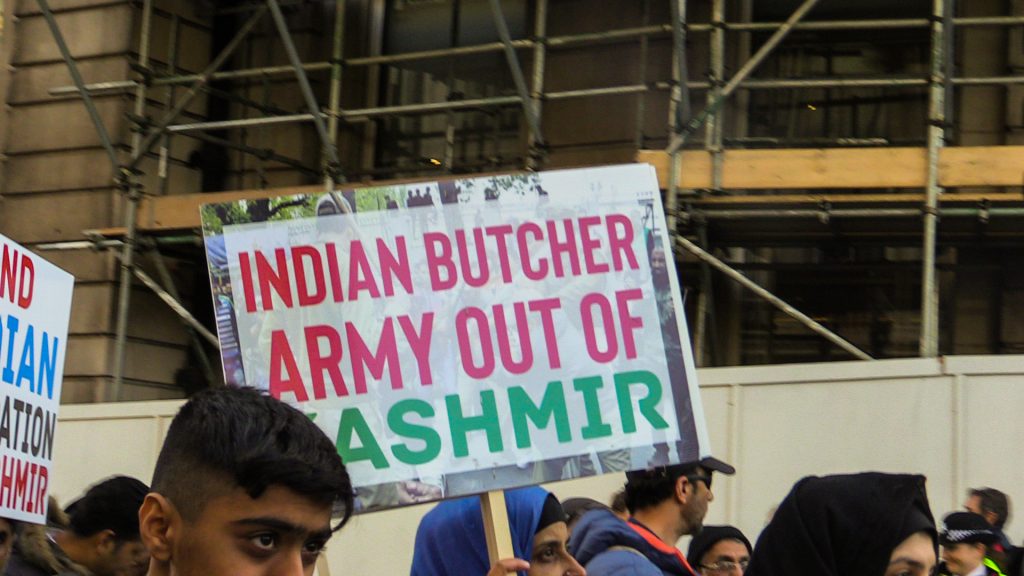
Credits to Ioanna-Rantina Koutsafti
Before all these questions, the protesters wanted to ‘let people know’ about Kashmir being locked down. “I mean people are walking by and thinking, ‘there’s a lot of noise going on’, I don’t blame them. They obviously don’t know. But I put the ‘Please Ask’ sign behind my placard. I just wished somebody would come and ask what’s going on. So they know, that we are not just here making noise,” Abdullah continued. Her own agenda of the rally was to inform and to share her values with more people. On top of that, it was to demand the British government’s attention on this matter, to take part in the international community for universal well-being.
A day after the protest, 27 MPs from 11 countries, the delegation of the EU, paid a visit to India in order to check out the situation in Kashmir. So far, foreign journalists are strictly restricted to cover any stories coming from Kashmir after 5 August decision and nobody is able to estimate what has happened or happening inside the fence. “We urge the Indian authorities to unlock the situation and fully restore the rights that are currently being denied.”, said Rupert Colville, the UN High Commissioner for Human Rights, at UN press briefing.
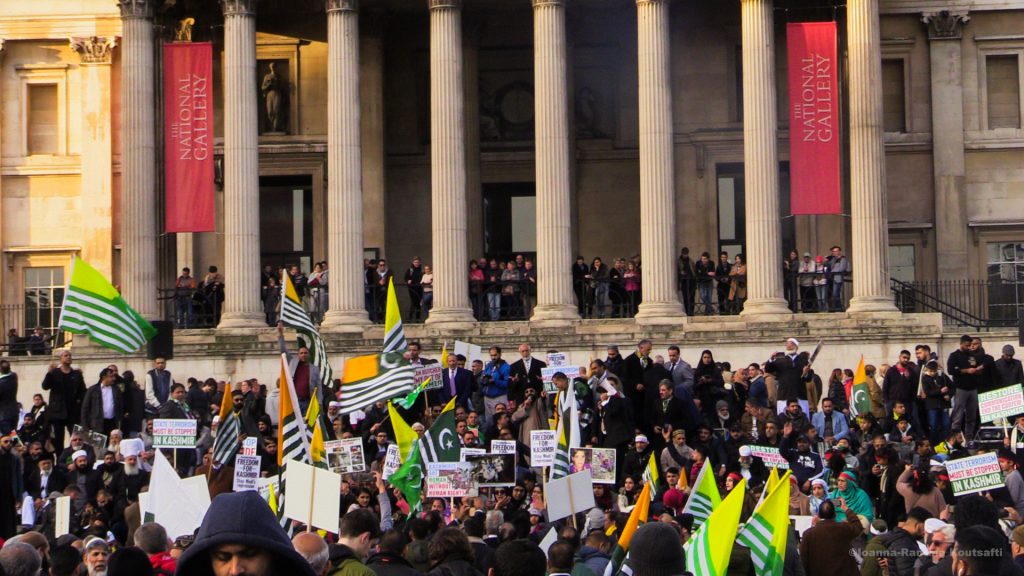
Credits to Ioanna-Rantina Koutsafti
“ I am from Kashmir. That’s one reason, but any human being who has a good heart will actually feel for them,” Mr L answered when he was asked why he joined the demonstration. Lately, the Extinction Rebellion or the Pro/Anti-Brexit protests have been under the spotlight from the press, as well as the public. This is not to pose a debate on whether both theses are meaningful or not, but it’s worth to have a talk about what the essence of the protest is. How the protest makes changes and draws solidarity from good hearts.
Here’s a live-streamed clip of #FreeKashmir protest:
Kashmir solidarity #protest is on at Downing Street. The protesters are marchig towards Trafalgar Square. #KashmirWantsFreedom #kashmirwomenmarch #kashmirsolidarityprotest #london #londonnews #news #voiceoflondonuk #vol pic.twitter.com/3fWf87FpYX
— Voice Of London UK (@VoiceOfLondonUK) October 27, 2019
Words: Kim Se Hee
Photo: Ioanna-Rantina Koutsafti, William Baulch from Foreign Brief, Ahmer Khan
Video: Kim Se Hee, Ioanna-Rantina Koutsafti

